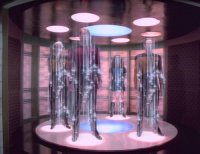For this post I have added the ‘upsight’ category, to borrow a term from Neal Stephenson’s rather marvellous Anathem.
My upsight today was realising not only that humanity are in the process of throwing off the influence of evolution, but also to see just how broad that influence really is, and from that, why it will cost us so dearly in the short term, and reward us so profoundly in the long.
Evolution, as far as I can see, is a combination of a random process, e.g. genetic recombination, with a non-random selector (e.g. darwinian ‘fitness’). In other words, for the problem of survival and propagation, evolution is all about trial and error.
Trial and error works. It can take a long time though, especially if the cost of error is death, and the process can be alarmingly expensive. As such, evolution is all about very very long stretches of time.
Trial and error is also susceptible to capture by local maxima. Imagine an isolated species of moss whose entire evolutionary fitness is determined by how high it climbs. Lets assume this imaginary moss can only spread its spores a meter or so at a time. Successive generations of this moss will slowly climb the hill on which they originated, eventually reaching the peak. They will do well on that peak, but not as well as they might do on the mountain range across the valley, a few kilometres away.
One simple game-theoretic or computing answer to this is a gimmick called simulated annealing. That’s where, instead of always seeking greater fitness, you occasionally do something randomly much worse, go in a random direction, on the offchance that it will lead to a greater win in the long term.
Those who are still awake at this point will immediately observe that this is exactly what evolution does: random mutations are mostly bad. Only one random swerve in umpty gazillion leads you to develop lungs and crawl our of the sea, but that’s how it works, right?
Yes and no. The problem with simulated annealing lies in the size and frequency of those jumps. If our moss has simulated annealing of, say, a ten meter jump roughly every hundred generations, it could take a very VERY long time to get off the hill and reach the mountains. The hill is more likely to go volcanic before that ever happens, and wipe the moss out. Suppose we give it a hundred meter jump every ten generations… Now it will reach those mountains in no time. This is true. It will go almost everywhere in no time flat. Unfortunately, it will also become extinct, since it has effectively ceased to climb hills at all; a feature which we defined as vital to its survival in the first place.
Biological evolution can only allow so many changes per generation, with a fixed limit to how far those changes can go. More than that, and a species will degrade over time, and eventually fail.
This puts many advantageous and even vital changes out of reach of biological evolution.
It has been pointed out to me that this is an over simplification; visualising simulated annealing in this few dimensions is inherently misleading. I stand by my point though; that the jumps are necessarily too small, as follows:
To give an example, the first sea-creature to grow legs and lungs gained exclusive access the whole land-area surface of the earth. It is entirely possible that its genes are in all of us, and most mammals. The first creature to evolve superorbital flight, radiation hardening, vacuum-tolerance and some kind of re-entry and landing mechanism could colonise Mars, Venus, and conceivably every other planet in the universe. That would be a much, much larger evolutionary win, but it can obviously never happen. Not that way. Pure trial-and-error will never lead to a lateral jump that big.
So, something different happens: we think.
You could argue very plausibly that our thinking is just a radical new form of evolved fitness, exactly the one described above, but that would be overlooking the nature of evolution: it is random. In addition to trying the good change, it will (must) always try nearly every possible bad one. Thinking lets us do better: not only can we see in advance that many bad ideas are bad (and avoid them), we can also do diabolically clever things like theorise about how a system works, and work backwards from an outcome to the possible solutions which might lead there. Not only can we solve problems many orders of magnitude more quickly and cheaply than trial-and-error, we can select among solutions and choose the best one. The cavernous gaps between mountains present no obstacle to choosing a mountain if one can see all the mountains and immediately perceive which one is tallest.
This is a radical change, but it isn’t just biological evolution lying in the dust.
Consider naturopathic or herbal medicines as opposed to the newest pharmaceuticals (ignoring the awkward transition phase in between):
To discover a natural medicine, you just seek out new plants and substances, and try them. You ingest them or brew them, or plaster them on your skin. Some of them help. Many of them make you sick. Some of them kill you. It can be systemmatic, careful, and make use of educated guesses, but in the end it’s trial and error.
By comparison, most recent medicines are the result of a deductive process: we examine the problem at its most fundamental level, where biology becomes complex, shifty chemistry. Once we understand the problem, we theorise ways it could be solved, and work backwards from those solutions towards known, feasible chemicals, treatments, and eventually, products.
This is a triumph. I’m making a note here: HUGE SUCCESS!
It’s not just medicine either. Primitive man is both troubled and endangered by thunder and lightning. He invents a wrathful sky-god who hurls spears from the sky, and from this, elects to stay inside shelter when storms come. This approach increases his chances of survival, but is incomplete: he has no way of knowing about times and places when it is safe to go out into the storm. He will make various wrong conclusions when his tall, pointy places of worship to the sky-god are struck by lightning and catch fire.
Benjamin Franklin forms a number of plausible theories about what the lightening and thunder are, tests them, and comes up with a very robust explanation involving electrostatic discharge. Lightning rods are just an obvious product of this understanding, little or no trial-and-error is required. There is no need to line up thousands of people in hundreds of thunderstorms to determine the circumstances under which it is safe to go out in a storm; these insights come to us fully formed from the supported theory, and can be applied immediately.
I’m sure you can see where I’m going with this.
Our lives are still riddled with trial-and-error. Some of it is fun, and will probably remain part of being human forever. Other parts are just baggage of our evolutionary heritage.
Those parts’ days are numbered. Science is coming. Thank goodness.
Update: Sabik has helpfully pointed out a whole bunch of places where I was either factually incorrect, talking crap, or just subtly out of line. For example, I mistook Benjamin Franklin for Thomas Edison. Burning-elephant-ooops. I have done my best to revise this post to take these myriad goofs into account. Many, many thanks. I suppose I should write a sequel post now, and call it ‘Transcending Evolution Engineers”. 🙂


 Of course, neither of us are quite as villainous as
Of course, neither of us are quite as villainous as 


 You’re a theoretical scientist. You have a complex theory, or theories, from the edge of your field, which synthesize breakthroughs in several adjacent fields. You don’t know enough about the neighbouring fields to really properly test this theory yet though, and neither does any other individual human being. So, you go round the leading minds in those fields, and borrow their life-recordings for their latest twenty years work, including all of their own postgraduate study. You upload it all. Now, suddenly, you’re an expert in all of those fields. Not only do you have all the underpinnings your theory could ever need, you now have the practical experience to empirically test it too.
You’re a theoretical scientist. You have a complex theory, or theories, from the edge of your field, which synthesize breakthroughs in several adjacent fields. You don’t know enough about the neighbouring fields to really properly test this theory yet though, and neither does any other individual human being. So, you go round the leading minds in those fields, and borrow their life-recordings for their latest twenty years work, including all of their own postgraduate study. You upload it all. Now, suddenly, you’re an expert in all of those fields. Not only do you have all the underpinnings your theory could ever need, you now have the practical experience to empirically test it too.